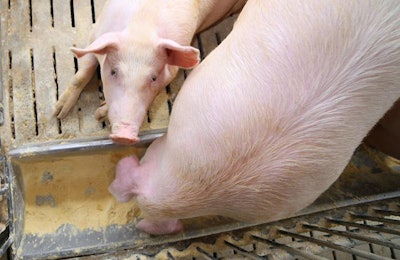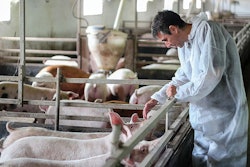
African swine fever (ASF) has returned to a new region of Cambodia and to Bulgaria, while new outbreaks have been reported in domestic pigs in China, Poland, Romania, Ukraine and Vietnam.
After an apparent absence of about six weeks, ASF returned to Cambodia at the end of June, according to the latest report from the agriculture ministry to the World Organisation for Animal Health (OIE). There were 14 cases of the disease among the 586 pigs involved, and six animals died.
The outbreak is recorded as taking place in village of Kampong Serey in the central province of Kampong Cham, but the report indicates that the virus was detected in pigs in the neighboring province of Tboung Khmum, which borders Vietnam.
The agriculture minister has ordered all pigs in the outbreak zones to be culled, reports Xinhua. He has also banned the sale and transport of pigs and pork within a three-kilometer radius of the outbreak, and ordered intensive surveillance and monitoring for signs of the disease to be carried out on pigs within 10 kilometers.
At the start of June, the ministry had reported to the OIE that the ASF situation in the country had been “resolved.” The move came after seven confirmed outbreaks affecting more than 2,600 pigs in the province of Ratanakiri, which is in the northeast of the country and also shares a border with Vietnam.
China tightens up ASF testing
China’s agriculture ministry has reported to the OIE one new outbreak of ASF in Ningxia province. At the end of June, the virus was detected after one pig died of a group of 142 animals at a slaughterhouse in Zhongwei. All the remaining animals were destroyed. This was the third ASF outbreak in the province this year.
The incidence of new ASF outbreaks in China is clearly slowing down, and pig production is gradually recovering, according to Yu Kangzhen, deputy director of the Ministry of Agriculture and Rural Affairs (MARA), speaking at a press conference this week.
There have been 143 outbreaks of the disease, and 116,000 pigs had been culled, he said, adding that the disease situation remains “complicated and grim.”
Action by state and regional authorities will be required to gain control over ASF and prevent the outbreak of animal diseases, but Yu stressed the importance of pig farmers reviewing and tightening up biosecurity on their own units.
At the end of June, MARA issued a statement on the testing to be carried out on all pigs delivered to Chinese slaughterhouses, according to the United Nations’ Food and Agriculture Organization (FAO).
Key points are that blood samples must be taken from every pig delivered to the slaughterhouse. A pooled blood sample that tests positive for the virus must be regarded as suspect, reported, and disinfection must be initiated. According to MARA, current antigen test strips are not sensitive enough to give a reliable result except as a quick preliminary test on a sick or dead pig.
ASF changes Vietnam’s meat markets
In Vietnam, there has been one new confirmed ASF outbreak. This occurred in a village herd of 21 pigs in the province of Ben Tre in the Mekong Delta region, according to the ministry of agriculture’s latest report to the OIE. The infection appears to have been detected before any of the animals had died.
Although the disease does not pose a threat to human health, demand for pork in Vietnam has fallen since the ASF outbreaks began, reports Vietnam News. However, losses of animals have been so high — more than 2.6 million pigs and 30% of the breeding herd have been lost in 60 of the country’s 63 regions so far this year — that forecasters say the country’s pork supply may be down by as much as 50,000 metric tons or 20% for the celebration of the 2020 Lunar New Year. Citing a report by Ipsos Business Consulting, the news source points to ASF raising pork prices in Vietnam, leading to a surge in pork imports, and to consumers switching to other meats or fish, as well as to branded pig meat products, with their guaranteed quality and safety.
Europe: New ASF cases in small herds
After an apparent absence since September 2018, ASF has returned to domestic pigs in Bulgaria, according to a recent agriculture ministry report to the OIE. In early July, the virus was detected in a backyard herd after two of the animals died in the Pleven region in the north of the country, close to the border with Romania.
There were 11 confirmed outbreaks of ASF in Romanian domestic pigs in five southern counties over the period June 15-25, according to latest reports from the country’s veterinary agency to the OIE. A total of 85 pigs were lost to the disease, including 22 mortalities. Ten of the cases were at one farm, and the rest were in backyards ranging in size from one to 18 pigs.
Almost 520 pigs have been lost to ASF through mortality and culling in Poland since June 24, according to the official report to the OIE from the agriculture ministry. Located in different districts in the regions of Warmia-Masuria and Masovia, all five affected herds were on “farms” ranging in size from 20 to 277 pigs. So far this year, ASF has affected 12 Polish pig farms.
After a brief absence, the ASF has returned to the Mykolaiv region in the south of Ukraine. The virus was detected after two pigs of a backyard herd died. Two more animals have been destroyed.
Ukraine’s animal health agency has also reported two other outbreaks of the disease to the OIE. Affected were a farm of 359 pigs in Zaporizhzhia in the southeast of the country, and a backyard herd in the southwestern province of Donetsk.
Africa: Zimbabwe: no ASF cases for four months
There have now been no confirmed ASF cases in Zimbabwe for four months, according to the official report from the livestock department to the OIE. Nevertheless, the district remains under quarantine, and surveillance activities and awareness campaigns for stakeholders in the pig and pork value chain are continuing.
Other Asian states impose new ASF-related controls
In the last week of June, the Department of Agriculture of the Philippines imposed a temporary ban on live pigs and their products from Laos and North Korea. The move aimed to protect the country’s own pork industry from ASF, reported ABS-CBN.
In Taiwan, new regulations coming into force next month will require all vehicles transporting pigs to slaughterhouses to be equipped with GPS trackers, according to Taipei Times.
So far, approximately 1,400 trucks have this technology installed. More than 500 more vehicles will have to have GPS fitted and in operation to avoid a fine of as much as TWD15,000 Taiwan (US$482), and TWD150,000 for owners of vehicles transporting pork or other pig products.
Taiwan’s authorities regard the transportation of pigs as among the most likely means for the transmission of the ASF virus, and past travel data could aid the control of the disease should the infection enter the state. Its Council of Agriculture is subsidizing the installation of the trackers, and mobile internet fees for two years.
Malaysia has called a halt to pork exports, reports Malay Mail. The Southeast Asian country has not reported any signs of ASF, but it is keeping its production for domestic consumption after banning imports from other Asian states affected by the disease.
According to a senior official at the agriculture ministry, around 40% of the population eat pork, and Malaysia is 93% self sufficient in the meat.
More ASF cases in European wild boar
Based on official reports to the OIE from the respective animal health agencies, ASF has been confirmed in new cases in wild boar in five countries over the past week. Compared with recent months, the numbers of infected animals have dipped. Latvia reported the most cases (5), followed by Romania (4), Bulgaria (3), Russia (2) and Belgium (1).
View our continuing coverage of the African swine fever outbreak.

















